Can HRT Improve Your Libido? What the Science Says
For those experiencing the uncomfortable symptoms of menopause, hormone replacement therapy can offer significant relief. By supplementing decreasing hormone levels, HRT aims to manage these symptoms for a better quality of life.
HRT can address the physical menopausal discomforts that lead to a decline in libido by balancing hormone levels. Further research shows that hormone treatment can increase energy levels and enhance mood, which could also positively affect your interest in sexual activity.
How Does HRT Relieve Menopausal Symptoms Affecting Sexual Health?
Hormone Replacement Therapy helps ease menopause-related sexual health issues by replenishing declining estrogen levels. Women who continue to experience low sexual desire despite estrogen therapy may be prescribed testosterone treatment or some physicians will add progestrogen.
· Increases lubrication and elasticity – vaginal atrophy is a common menopause symptom. HRT restores elasticity, improves lubrication, and plumps the tissue. This reduces discomfort and makes intimacy more comfortable due to improved vaginal lubrication and elasticity.
· Improves blood flow – estrogen therapy enhances blood circulation in the vaginal area, which heightens sensation and also helps combat dryness.
· Reduces irritation – balanced hormones ease itching and burning. HRT directly addresses these issues and restores comfort.
· Enhances quality of life – by relieving menopausal symptoms, HRT helps women feel healthier. A stronger sense of well-being often leads to more fulfilling intimacy for women facing low testosterone and libido.
The Emotional, Mental and Psychological Benefits of HRT
HRT provides numerous benefits, including reduced symptoms of depression and anxiety by stabilizing hormones, particularly estrogen. Sleep, often disrupted by night sweats, improves in quality, since HRT can indirectly enhance emotional well-being.
- Reduces depression and anxiety – low estrogen disrupts serotonin and dopamine. Medical science ascribes low brain chemistry to psychological distress and anxiety, and HRT can help balance these neurotransmitters and restore emotional stability.
- Stabilizes mood swings – declining estrogen and progesterone affect brain chemistry. HRT restores balance, helping women maintain steady temperaments throughout the day.
- Improves sleep quality – hot flashes and night sweats often interrupt rest. HRT reduces these symptoms, allowing for more refreshing sleep.
- Enhances cognitive function – estrogen and other female hormones support clear thinking and focus. With sufficient HRT, women experience sharper concentration and less brain fog. These hormone replacement therapy benefits improve daily performance and mental well-being.
- Increased resilience – many patients report stronger emotional control and steadier moods with HRT. These individuals may also develop more effective coping skills during challenging times.
- Greater emotional expressiveness – research shows HRT can increase emotional honesty. It may also reduce alexithymia (the inability to describe one’s own emotions), making it easier to identify and share emotions.
Is There a Connection Between Emotional Well-being and Sexual Desire?
Emotional health affects sexual desire considerably. Stress, anxiety, and depression lower sexual drive by distracting the mind. Meanwhile, positive emotions, such as love and relationship satisfaction, often enhance desire and connection.
Open communication with a partner supports intimacy, while regular exercise and stress management also improve attitude and sexual health. Professional therapy can guide women toward balance and confidence. In-depth hormone therapy research shows that better mental health often leads to stronger sexual desire and overall well-being.
Ongoing stress raises cortisol, which suppresses libido. At the same time, insufficient serotonin and dopamine, as well as recently discussed brain inflammation, cause depression and can lower interest in sex. Anxiety can trigger the body’s stress response, keeping it on high alert and focusing energy on survival instead of arousal. This persistent, vigilant and anxious state often leads to burnout.
Mental health struggles often lower self-esteem and create insecurity. Many people then worry about sexual performance, which builds a cycle of anxiety and reduced desire. Constant worry and mental fatigue create distractions that make it difficult to feel pleasure. Many women find that HRT and libido improvements go hand in hand, since balanced hormones can ease stress effects and support a healthier sex drive.
Positive emotional health can greatly enhance sexual well-being. When people feel close and connected to their partner, sexual desire often increases. Balanced mental health reduces stress, which supports emotional, physical, and sexual wellness, creating a positive cycle. Feeling good about oneself boosts confidence, making it easier to enjoy intimacy and fully engage in sexual activity. Together, these factors show how strong emotional health can improve desire and sexual experiences.
Reclaim Your Desire: How HRT Can Help
Regaining your sexual desire during menopause is possible with the proper support. HRT can help balance sexual health and hormones, easing symptoms like dryness, lethargy, and emotional changes. Many women also notice improved confidence, emotional well-being, and stronger connections with their partners.
At The Studio Med Spa, we guide women through personalized HRT plans, combining expert care with support for emotional and physical health. By addressing hormonal changes and lifestyle factors, we help women feel more confident, energized, and in tune with their sexual well-being.




